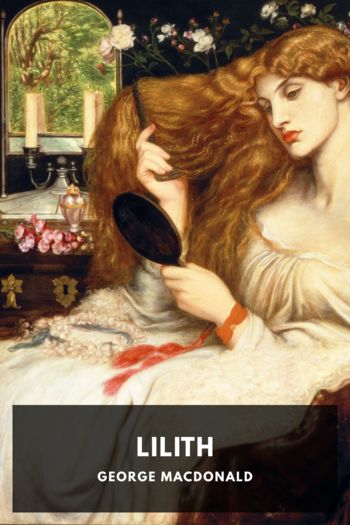Lilith by George MacDonald (ebook reader below 3000 .TXT) 📕

- Author: George MacDonald
Book online «Lilith by George MacDonald (ebook reader below 3000 .TXT) 📕». Author George MacDonald
“How long must they flaunt their facelessness in faceless eyes?” I wondered. “How long will the frightful punition endure? Have they at length begun to love and be wise? Have they yet yielded to the shame that has found them?”
I heard not a word, saw not a movement of one naked mouth. Were they because of lying bereft of speech? With their eyes they spoke as if longing to be understood: was it truth or was it falsehood that spoke in their eyes? They seemed to know one another: did they see one skull beautiful, and another plain? Difference must be there, and they had had long study of skulls!
My body was to theirs no obstacle: was I a body, and were they but forms? or was I but a form, and were they bodies? The moment one of the dancers came close against me, that moment he or she was on the other side of me, and I could tell, without seeing, which, whether man or woman, had passed through my house.
On many of the skulls the hair held its place, and however dressed, or in itself however beautiful, to my eyes looked frightful on the bones of the forehead and temples. In such case, the outer ear often remained also, and at its tip, the jewel of the ear as Sidney calls it, would hang, glimmering, gleaming, or sparkling, pearl or opal or diamond—under the night of brown or of raven locks, the sunrise of golden ripples, or the moonshine of pale, interclouded, fluffy cirri—lichenous all on the ivory-white or damp-yellow naked bone. I looked down and saw the daintily domed instep; I looked up and saw the plump shoulders basing the spring of the round full neck—which withered at half-height to the fluted shaft of a gibbose cranium.
The music became wilder, the dance faster and faster; eyes flared and flashed, jewels twinkled and glittered, casting colour and fire on the pallid grins that glode through the hall, weaving a ghastly rhythmic woof in intricate maze of multitudinous motion, when sudden came a pause, and every eye turned to the same spot:—in the doorway stood a woman, perfect in form, in holding, and in hue, regarding the company as from the pedestal of a goddess, while the dancers stood “like one forbid,” frozen to a new death by the vision of a life that killed. “Dead things, I live!” said her scornful glance. Then, at once, like leaves in which an instant wind awakes, they turned each to another, and broke afresh into melodious consorted motion, a new expression in their eyes, late solitary, now filled with the interchange of a common triumph. “Thou also,” they seemed to say, “wilt soon become weak as we! thou wilt soon become like unto us!” I turned mine again to the woman—and saw upon her side a small dark shadow.
She had seen the change in the dead stare; she looked down; she understood the talking eyes; she pressed both her lovely hands on the shadow, gave a smothered cry, and fled. The birds moved rustling in their nests, and a flash of joy lit up the eyes of the dancers, when suddenly a warm wind, growing in strength as it swept through the place, blew out every light. But the low moon yet glimmered on the horizon with “sick assay” to shine, and a turbid radiance yet gleamed from so many eyes, that I saw well enough what followed. As if each shape had been but a snow-image, it began to fall to pieces, ruining in the warm wind. In papery flakes the flesh peeled from its bones, dropping like soiled snow from under its garments; these fell fluttering in rags and strips, and the whole white skeleton, emerging from garment and flesh together, stood bare and lank amid the decay that littered the floor. A faint rattling shiver went through the naked company; pair after pair the lamping eyes went out; and the darkness grew round me with the loneliness. For a moment the leaves were still swept fluttering all one way; then the wind ceased, and the owl floated silent through the silent night.
Not for a moment had I been afraid. It is true that whoever would cross the threshold of any world, must leave fear behind him; but, for myself, I could claim no part in its absence. No conscious courage was operant in me; simply, I was not afraid. I neither knew why I was not afraid, nor wherefore I might have been afraid. I feared not even fear—which of all dangers is the most dangerous.
I went out into the wood, at once to resume my journey. Another moon was rising, and I turned my face toward it.
XVII A Grotesque TragedyI had not gone ten paces when I caught sight of a strange-looking object, and went nearer to know what it might be. I found it a mouldering carriage of ancient form, ruinous but still upright on its heavy wheels. On each side of the pole, still in its place, lay the skeleton of





Comments (0)